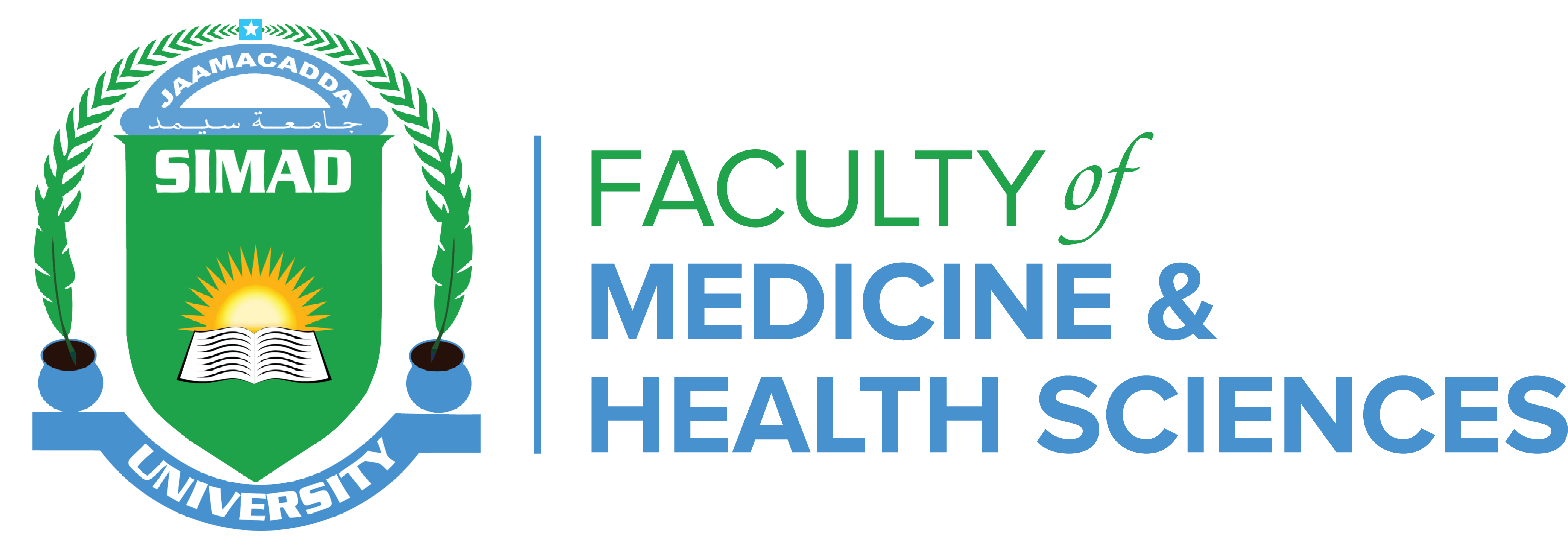Medicine and Surgery
This rigorous and highly respected six-year program prepares future doctors through a
balanced integration of foundational biomedical sciences, clinical knowledge, and hands-on
patient care. Students gain early clinical exposure and develop diagnostic and decision-
making skills, ensuring they graduate as competent, ethical, and compassionate physicians
ready to serve and lead in healthcare systems locally and globally.
- Completion of secondary school with a minimum overall average of 50%
- Should bring the original and a copy of secondary school certificate
- Should bring Six (6) passport size photos with white background
- Should bring the original copy of a letter of good conduct issued by your secondary school
- Should bring a sponsorship letter from your guardian
- Should successfully pass an admission interview and/or test
- Pay non-refundable Processing and ID card fees of USD $50 (bank draft)
Year 1
Semester 1
Arabic Language I – 3 credits
Fundamentals of Computing – 3 credits
Study Skills – 3 credits
Cell Biology – 4 credits
General Chemistry – 4 credits
Medical Terminology – 4 credits
Semester 2
Computer Application Technology – 3 credits
Islamic Studies I – 3 credits
Organic Chemistry – 4 credits
Medical Physics – 4 credits
Genetics – 4 credits
Year 2
Semester 1
Arabic Language II – 3 credits
Principles of Management – 3 credits
Physiology I – 4 credits
Systemic Anatomy – 6 credits
Biochemistry I – 6 credits
Histology – 4 credits
Embryology – 4 credits
Medical Ethics – 2 credits
Semester 2
Islamic Studies II – 3 credits
Physiology II – 4 credits
Biochemistry II – 6 credits
Microbiology I – 6 credits
Regional Anatomy I – 4 credits
Introduction to Community Medicine – 4 credits
Year 3
Semester 1
Communication Skills – 3 credits
Physiology III – 4 credits
Pharmacology I – 4 credits
Regional Anatomy II – 4 credits
General Pathology – 4 credits
Microbiology II – 6 credits
Parasitology – 6 credits
Primary Health Care – 4 credits
Semester 2
Regional Anatomy III – 4 credits
Immunology – 4 credits
Systemic Pathology – 6 credits
Nutrition – 4 credits
Biostatistics – 4 credits
Pharmacology II – 4 credits
Year 4
Semester 1
Epidemiology – 4 credits
Radiology – 4 credits
Basic Clinical Skills – 4 credits
Forensic Medicine & Toxicology – 4 credits
Semester 2
Research Methodology – 4 credits
Dermatology – 4 credits
Infectious Diseases – 4 credits
Internal Medicine I – 4 credits
Pulmonology – 4 credits
Gastrointestinal Tract (GIT) – 8 credits
Endocrinology – 4 credits
Year 5
Semester 1
Internal Medicine II – 8 credits
Cardiology – 8 credits
Nephrology – 6 credits
Hematology – 6 credits
Surgery I – 16 credits
Anesthesiology – 4 credits
Semester 2
Surgery II – 16 credits
Emergency Medicine – 4 credits
Ophthalmology – 4 credits
Otorhinolaryngology (ENT) – 4 credits
Laboratory Diagnostics – 4 credits
Psychiatry – 4 credits
Year 6
Semester 1
Orthopedics & Traumatology – 4 credits
Pediatrics I – 14 credits
Obstetrics – 14 credits
Basic Surgical Skills – 2 credits
Community Outreach – 4 credits
Semester 2
Pediatrics II – 14 credits
Gynecology – 14 credits
Health Systems Management – 4 credits
Stomatology – 4 credits
Thesis – 10 credits
Year 7
Internship (13 weeks each)
Internal Medicine
Pediatrics
Obstetrics & Gynecology
Surgery
Community Medicine
7 years
Fees($): $1220.00
Charges($): $130.00
Total($): $1350.00
STUDENTS FEES PAYMENT POLICY
This policy applies to all students, these include: part-time and full-time for both undergraduate and postgraduate and any other person enrolled as a student at the University:
- Option one: At the beginning of the semester, all semester fees can be paid in full.
- Option two: At the beginning of the semester, students should pay 30% of semester fees before he/she registers for the class. In the second installment, 40% of the semester fees should be paid before the midterm exam. The remaining 30% of the semester fees should be paid before the final exam.
- After payments of second and third installments, students are eligible to get their clearance cards for midterm and final exams.
- Fees Collector officer will be responsible to check fees default when he/she gets a report from the head of the cash unit.
- SU will not refund any fees paid unless the student has no remaining semester.
- Students and sponsors who unintentionally or intentionally deposit fees will not be refunded but will be forwarded to the next semesters.
- Upon graduation period, all extra fees balance should be refunded to the students.
- Any student who temporarily or permanently breaks his/her study can request an extra fee refund.
- Head of Cash Unit should check the activities of the sponsors.
Bank Accounts
Premier Bank: 20300001001
Dahabshiil: 1822
Salam Bank: 30027598
Idman Community Bank: 7401005
IBS Bank: 1820
The SU academic year consists of 42 weeks split into two semesters of 18 weeks each, the first beginning in August.
- General Practitioner (GP): Serve as a front-line physician diagnosing
and treating patients across a wide range of medical issues. - Specialist Physician: Pursue postgraduate training to specialize in fields
such as surgery, pediatrics, internal medicine, or obstetrics and
gynecology. - Medical Officer: Work in public hospitals or private clinics
providing critical medical services. - Public Health Physician: Engage in disease prevention and health
policy development at national or international health organizations. - Clinical Research Associate: Join pharmaceutical companies or
academic centers in conducting clinical trials and medical research. - Medical Lecturer or Academic Researcher: Teach and supervise medical
students or conduct innovative research in university settings. - Hospital Administrator or Health Policy Advisor: Lead healthcare
services or shape national health strategiesthrough policy development.
